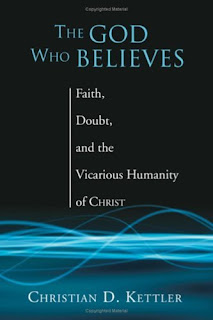Sharing in Jesus' knowing, believing and obeying
 In the last two posts, I've shared quotes from Christian Kettler's book, "The God Who Believes," in which he discusses Jesus' believing, knowing and acting on our behalf. Here are more:
In the last two posts, I've shared quotes from Christian Kettler's book, "The God Who Believes," in which he discusses Jesus' believing, knowing and acting on our behalf. Here are more:Lest we misunderstand, this does not mean that there is not a place for our own believing, knowing, and acting. According to Kettler, "Because Jesus believes for us does not exclude the imperative for us to believe!" (p. 71). However, Kettler notes that "we do not initiate our knowledge of God" (p. 71). Jesus is the only human who truly knows God; and he shares, by grace, that knowledge with us. Thus the faith that saves us, is Jesus' faith, not our own. And his faith is grounded in his intimate knowledge of the Father. And so we know God, because Jesus knows God and shares that knowledge with us. Thus Kettler quotes Karl Barth: "We must not only believe in the risen Christ. We must believe with the risen Christ" (p. 72).
"But," some might retort, "don't we know God because he is revealed to us in Scripture?" Kettler responds by noting that, "The Bible has no authority of its own. The Bible has genuine authority because Jesus reads it with us today" (p. 73, referencing Ray Anderson). Kettler continues: "Knowledge of God, divine revelation, is essentially discovered in the humanity of Christ, the 'real text' of revelation" (quoting T.F. Torrance).
The key point in this is the vicarious (representative, substitutionary) humanity of Jesus. The eternal Son of God became one of us in order to stand in for us - to have faith for us, which as noted above is grounded in his intimate knowledge of God for us. The same can be said about our obedience.Our Christian discipleship (growth in Christ), which leads to our transformation, "is more than 'The Little Engine That Could': 'I think I can...I think I can...' Christ loves before we love...Then we can enter with him into the practical movement and consequences of that faith and love" (p. 76). Our obedience is our participation in Jesus' loving and living.
Kettler continues: "We are brought to God to worship, adore, and serve [Him], participating in the deep 'Abba' experience of the Son, his immediacy and intimacy with the...Father...a relationship that we have been unable to live" (pp. 80-81).
Jesus' lordship in all this, "Is not the lordship of an arbitrary sovereign, but a lordship that grants us the grace of participation in the intimate union between the Father and the Son through the Spirit, the 'condition' the Son creates for us (John 17:10, 18-23, 26; Eph 3:16-17)" (p.82). "Such a 'sweet exchange'...is the act of God's grace. Grace is not simply the reality of salvation, but just as important for the knowledge of God. Just as we have no ability to save ourselves, so also, we have no ability to know the Holy One of Israel (Exod 3:4). As Torrance reminds us, the knowledge of God is neither based on nature (Roman Catholicism), nor on our own subjective piety (Protestant liberalism, and I might add, American evangelicalism). God provides the One from the human side who already knows God. This is an act of God's grace as much as salvation is" (p.83).
But if God knows/believes/obeys for us, then why should we participate? Kettler answers: "Having received [all these graces from God]...means that a wellspring of gratitude can now flow forth" (p.85). Along similar lines, and now concerning our participation in the faith of Christ, Kettler asks, "What is faith in Christ...if the faith of Christ is significant? Here is not a continuation of Christ's faith by our imitation, but a genuine following of Jesus. Such following is an actual following Jesus down his road, but realizing that he always goes before us. He is the 'pioneer' (Heb. 12:2), the Kit Carson, the Daniel Boone of our faith. So walking behind him is a genuine walking, a genuine faith, but not without him going first...He replaces our attempts to blaze our trails, even to help ourselves. Still, we are enabled to then walk the trail. We are enabled to actually have the knowledge of faith, yet it is faith in the 'exchange of status' between us, the 'sweet exchange' of his life for ours" (p. 85).
"We share in the intimacy of relationship in the Son's knowledge of the...Father through the Spirit. This is our 'adoption' as sons and daughters of God (Gal 4:4-7). Through this participation we are genuinely connected to, but not identified [confused] with the Son. Just as God's deity was not obliterated when he became human, so also our humanity is not destroyed as we participate in the vicarious humanity of Jesus. No longer is our salvation to be seen in terms of an ordo salutis, an order of salvation in which Christ is only an instrument that leads to our acts of justifying faith and sanctifying works. It is Christ who has beome for us 'wisdom from God, righteousness and sanctification and redemption' (1Cor 1:30). Sanctification is not to be seen as only 'our part.'" (p. 86).
"'Following Jesus' means not to [merely] imitate...but to be with him. To be with Jesus is to take up one's cross, to deny oneself, yet not apart from his cross and his self-denial (John 12:26)...Karl Barth's words are encouraging: 'It is good to be with Jesus and not elsewhere. This is good because there God Himself is good for us'" (p. 90).
Amen!